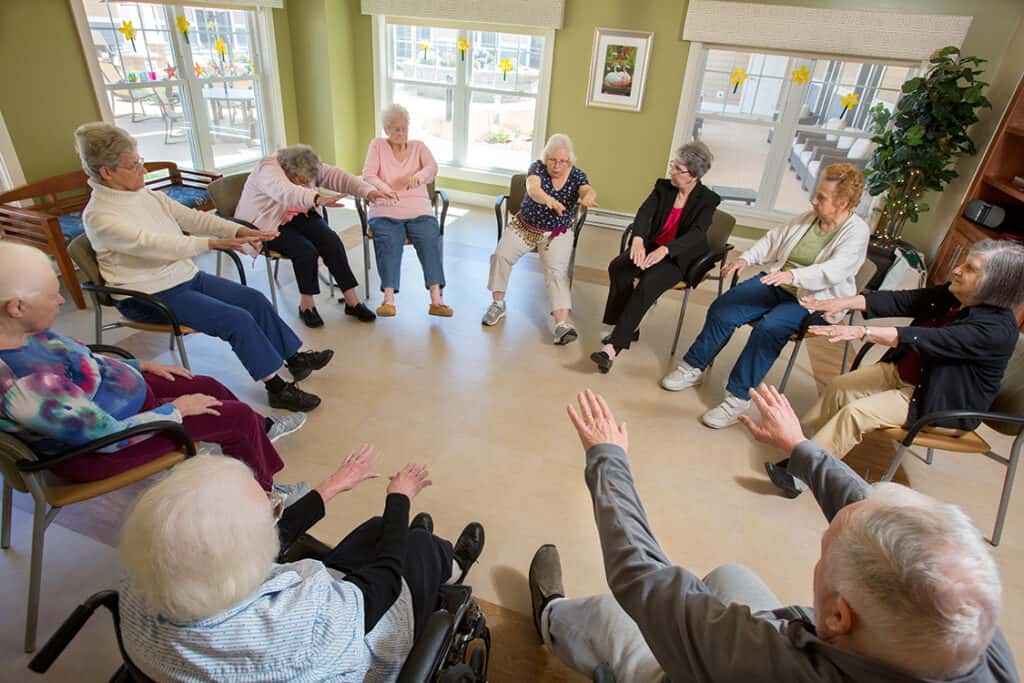Trusted Memory Care facilities providing constant support and security.
Trusted Memory Care facilities providing constant support and security.
Blog Article
Understanding Just How Aided Living Supports Patients With Dementia Care Needs
Assisted living centers are progressively identified for their pivotal function in dealing with the intricate treatment demands of patients with dementia. Assisted Living. By using an organized yet nurturing setting, these facilities not just advertise security and wellness but likewise promote a sense of autonomy via customized treatment strategies. Moreover, engaging tasks and socializing chances are essential to improving cognitive function and psychological wellness. Nevertheless, the nuances of just how these components interact to create an encouraging community warrant better assessment, specifically in understanding their long-lasting effect on homeowners' lifestyle.
Summary of Dementia Care
Mental deterioration care is progressively essential as the frequency of dementia-related conditions increases among aging populations. This expanding demographic pattern requires an extensive understanding of mental deterioration and the various approaches to care. Mental deterioration encompasses a variety of cognitive impairments that disrupt every day life, affecting memory, reasoning, and communication capacities. The problem can vary dramatically in its discussion, calling for customized treatment techniques to meet private demands.
Efficient mental deterioration care involves a multidisciplinary method, integrating clinical, mental, and social assistance. Health care specialists, caretakers, and member of the family must collaborate to create a nurturing environment that advertises the health of people with mental deterioration. Trick parts of mental deterioration treatment include customized care strategies, cognitive excitement treatments, and behavior interventions aimed at enhancing top quality of life.
In addition, it is crucial to recognize the psychological and psychological difficulties dealt with by both clients and caregivers. Education and learning and training for caretakers play a crucial function in promoting understanding and empathy, thereby boosting communications with those affected by mental deterioration. As the need for dementia care proceeds to increase, the focus has to remain on delivering thoughtful, person-centered care that respects the self-respect and preferences of people dealing with this condition.
(Charlotte Alzheimer's Care)
Function of Assisted Living Facilities
Helped living centers play a crucial function in supplying treatment for individuals with dementia, offering a supportive environment that balances independence with the necessary assistance. These centers are made to provide to the special requirements of citizens, promoting a sense of area while ensuring safety and security and health.
In an assisted living setting, qualified staff participants supply 24/7 support, assisting with day-to-day activities such as bathing, clothing, and medicine management. This degree of care is crucial for people with mental deterioration, that may fight with these jobs as a result of cognitive decline. Additionally, centers frequently incorporate memory-enhancing programs and social tasks tailored to boost cognitive functioning and urge social interaction.
The physical environment of assisted living centers is also maximized for safety, including protected entrances, well-lit pathways, and clear signs to assist homeowners navigate their environments. These areas promote a feeling of belonging, reducing the sensations of seclusion that individuals with mental deterioration might experience.
Personalized Care Program
To ensure that each resident gets one of the most suitable care, personalized care strategies are essential in nursing home for people with dementia. These plans are customized to fulfill the distinct requirements, choices, and challenges dealt with by each citizen, advertising their dignity and lifestyle.
The growth of an individualized care plan normally starts with a comprehensive assessment carried out by health care specialists. Memory Care. This assessment evaluates the individual's cognitive abilities, physical health and wellness, psychological well-being, and social preferences. Input from relative and the resident themselves is critical, as it provides important insights into their history, routines, and personal rate of interests
When the evaluation is total, a multidisciplinary team collaborates to produce a treatment plan that describes particular goals and interventions. This may include medication management, daily living assistance, and behavior strategies customized to minimize anxiousness or frustration.
Routine evaluations and updates to the care plan guarantee it continues to be pertinent as the person's condition evolves. Assisted Living. By focusing on individualized care, assisted living facilities can enhance the total health of citizens with dementia, fostering an environment that values their uniqueness while addressing their treatment requires efficiently
Engaging Tasks and Socialization
Engaging tasks and socialization play a vital duty in boosting the high quality of life for locals with dementia in nursing home. These activities are developed to boost cognitive feature, promote psychological well-being, and foster links among residents. Organized programs, such as art therapy, music sessions, and reminiscence treatment, provide opportunities for people to reveal themselves creatively while additionally activating favorable memories.
Socialization is equally essential, as it battles feelings of seclusion and solitude that can come with dementia. Team activities, consisting of games, team outings, and common eating, encourage communication and help you can try these out citizens build helpful relationships with peers and caregivers. This feeling of community not just improves their daily experiences yet also adds to a much more secure emotional atmosphere.
Furthermore, engaging activities can be tailored to private choices and cognitive levels, making sure that each resident can take part meaningfully. By producing a setting that prioritizes interaction and social communication, aided living facilities can considerably enhance homeowners' overall mental health and wellness, cultivating a feeling of purpose and belonging. Ultimately, these efforts are crucial components of detailed mental deterioration treatment, significantly affecting citizens' general health and joy.
Benefits of Community Assistance

Furthermore, neighborhood assistance advertises social interaction, which is crucial for cognitive and psychological health. Engaging with peers and joining group tasks can improve mood and urge memory, adding to a better sense of belonging. This social engagement is essential, as solitude and seclusion can worsen cognitive decline.

(Dementia Care Charlotte)
Conclusion
In final thought, assisted living facilities work as vital atmospheres for people with dementia, providing organized assistance that fosters both self-reliance and safety and security. The implementation of customized treatment strategies guarantees that each citizen's one-of-a-kind needs are satisfied, while involving tasks promote social interaction and cognitive interaction. In addition, the sense of neighborhood within these centers considerably alleviates sensations of seclusion, boosting overall emotional well-being. Hence, assisted living plays an important function in enhancing the lifestyle for individuals with mental deterioration.
Report this page